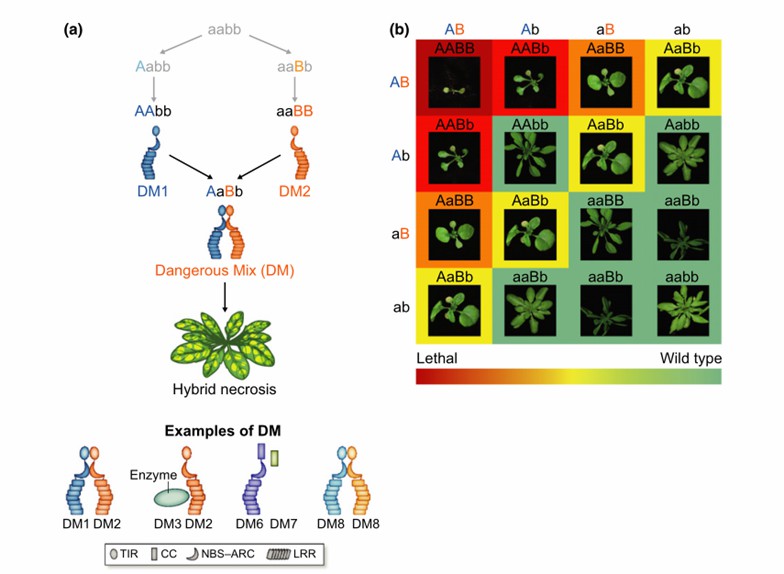Exploring the mechanisms of hybrid necrosis can prevent fitness penalty caused by immune conflicts in plant resistance breeding. Lifeasible contributes to several aspects of plant protection research and offers services to assist in hybrid necrosis.
Hybrid necrosis in plants is a genetic autoimmunity syndrome in the progeny of interspecific or intraspecific crosses. Massive diversification in immune receptors is a major factor in hybrid necrosis, and the nucleotide-binding and leucine-rich repeat (NLR) receptor is the prominent receptor that frequently triggers autoimmunity in hybrid plants. Two main mechanisms have been identified as responsible for hybrid necrosis. One mechanism is that guard proteins (often NLRs) are activated through interaction with plant proteins that mimic standard guardees modified by pathogen effector proteins. The other is the formation of inappropriately active immune receptor complexes. Many cases of hybrid necrosis fit the Bateson-Dobzhansky-Muller (BDM) model that explains hybrid incompatibility (Fig. 1). Studying hybrid necrosis can help reveal how plant immune receptors function in recognizing cellular invasion and activating signaling and optimize plant immunity in plant breeding.
 Fig. 1 Simple genetics of hybrid necrosis conforming to the Bateson–Dobzhansky–Muller (BDM) model (Wan et al., 2021).
Fig. 1 Simple genetics of hybrid necrosis conforming to the Bateson–Dobzhansky–Muller (BDM) model (Wan et al., 2021).
Lifeasible offers services to help study hybrid necrosis-related genes and the mechanism of hybrid necrosis.
Study of the localization of hybrid necrosis genes
We help locate hybrid necrosis genes. We help determine the chromosomal localization and fine localization of hybrid necrosis genes. We help with chromosome localization mainly based on the fluorescence in situ hybridization technique (FISH). The probes of this technique are easy to preserve. Multicolor labeling is possible based on this technique, which can be used to analyze fresh, frozen, or paraffin-embedded samples. For fine localization, we mainly base on linkage analysis and simple sequence repeats (SSR) labeling methods. We help with probe design, DNA extraction, PCR, electrophoretic assays, and analysis of results.
Genetic diversity of hybrid necrosis genes
Based on fine gene localization studies, we help design and validate molecular markers that co-segregate with hybrid necrosis alleles. We provide services to help examine the diversity of the validated molecular marker in multiple plant species to indirectly analyze the diversity of hybrid necrosis genes.
Validation and mechanism exploration of hybrid necrosis
We help design RNA interference to validate hybrid necrosis genes. We help enrich and analyze the structure of proteins encoded by hybrid necrosis genes and explore their interactions. In addition, we also help in gene editing of hybrid necrosis genes and help in analyzing the effect of different genetic alterations on hybrid necrosis. In the case of NLRs, we mainly help to edit genes of the C-terminal leucine-rich repeat (LRR) domain, which is associated with specific recognition, to explore their immune-related hybrid necrosis mechanisms.
Lifeasible provides professional services to help locate hybrid necrosis genes, detect the diversity of hybrid necrosis genes, and validate and explore the mechanism of hybrid necrosis. Please contact us to help you with your experiment.
References
Lifeasible has established a one-stop service platform for plants. In addition to obtaining customized solutions for plant genetic engineering, customers can also conduct follow-up analysis and research on plants through our analysis platform. The analytical services we provide include but are not limited to the following:
STU-CRISPR System Improves Plant Genome Editing Efficiency
April 19, 2024
Application of Exosomes in Facial Beauty
April 12, 2024